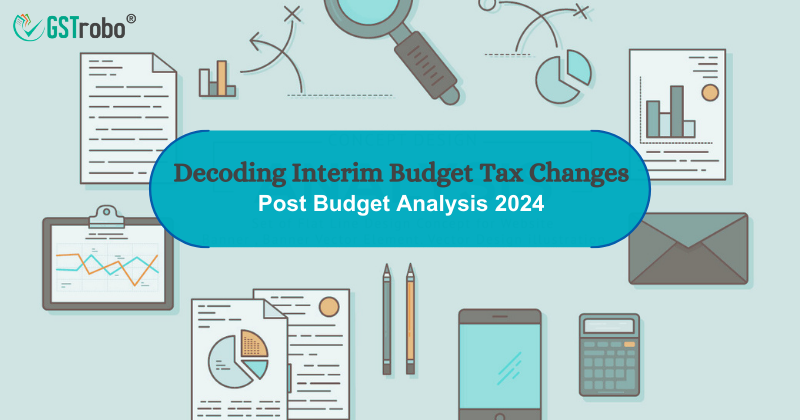Decoding Interim Budget Tax Changes – Post Budget Analysis 2024

The interim budget for 2024 is here, and the results are out to serve you our Budget Analysis 2024 from an Indian taxpayer point of view. While our Honorable Finance Minister Nirmala Sitharaman gave a new and reformed definition of GDP, governance, development, and performance, the road ahead does not look too bright for Indian taxpayers.
The salaried class, a significant contributor to the tax base, harboured expectations of a tax respite in the Interim Budget. The desire for relief from the direct tax burden fueled hopes for a revision in tax rates or an increase in exemptions.
Despite the positive response to the new tax regime introduced in the previous budget, the Interim Budget did not bring any additional measures to boost its acceptance. The finance minister maintained the status quo, refraining from significant changes in direct tax rates and exemptions.
Impact of Interim Budget 2024 on Taxpayers is evident. The taxpayers who had hesitated to switch to the new regime were left without further incentives to make the move.
Read In-Depth – Interim Budget 2024: Live Commentary and Highlights
Insights into Direct Tax Statistics
One key segment of Budget Analysis 2024 that was also highlighted by the finance minister is the positive trends in direct tax collection and return processing. Mentioning the stats, the number of tax return filers has significantly increased, and the average processing time has reduced from 93 days in FY 2013-14 to a mere 10 days in the current year.
Section 80C – Unmoved Limits
There are no changes in the deductions as the finance minister opted to keep the Section 80C limit stagnant at Rs 1.5 lakh. Considering the persistent surge in living costs and inflation, taxpayers had hoped for an increase in this threshold.
However, this expectation was left unaddressed in the Interim Budget 2024 India. No Tax Changes in Interim Budget 2024 come as an absolute disappointment.
Housing Loan Interest Deduction – No Alterations
Homeowners, anticipating changes in the deduction for interest paid on housing loans, were met with disappointment. The Interim Budget 2024 India maintained the existing provisions without any adjustments to the housing loan interest deduction
GST Regime – A Big Hit
Highlighting the commendable regime of GST in India, the finance minister emphasized its positive impact.
Revealing the survey results, she pinpointed that a whopping 94 percent of industry leaders expressed their confidence in the advantages brought about by the implementation of GST.
This consensus reflects the widespread acknowledgment of the positive outcomes stemming from the shift to a unified tax system.
In the context of budget analysis 2024, she further emphasized that the goods and services economy has enabled One Nation, One Market, One Tax, and the reforms have led to deepening and strengthening the tax base.
SGST Revenue Afloat – A Key Indicator of Success
The success of GST does not confine to perception; tangible results substantiate it. A stark rise in state revenues is seen in the pre-and post-GST eras.
During the four-year period from 2017-18 to 2022-23, the SGST revenue exhibited an impressive buoyancy factor of 1.22. This surge highlights the positive impact of GST on state finances, indicating a robust and dynamic revenue generation system.
In comparison, the pre-GST era, spanning from 2012-13 to 2015-16, saw a considerably lower tax collection of 0.72. The significant uptick in numbers post-GST underscores the effectiveness of the tax reform in enhancing revenue streams for the states. This reflects the impact of Interim Budget 2024 on taxpayers.
Benefits to States and Consumers
Broader economic indicators further complement the above survey findings. The finance minister highlighted that the GST implementation has led to supply chain optimization, eliminating tax arbitrage and octroi the Interim Budget 2024 India.
Consequently, by dismantling check posts at state and city boundaries, government streamlines the movement of goods.
In our budget analysis 2024, we see that the tax base of GST has more than doubled, and the average monthly gross GST collection has nearly doubled, reaching ₹1.66 lakh crore in the current fiscal year.
Consumer-Focused Impact
The ultimate beneficiaries of these GST reforms are the consumers. The reduction in logistics costs and taxes has contributed to a decline in most goods and services prices. This consumer-focused impact of Interim Budget 2024 on taxpayers reinforces the positive cascading effects of GST on the overall economy.
Tax Proposals and Exemptions
Keeping hopes uplifted for entrepreneurs, the government has extended benefits for Indian startups, investments by sovereign wealth or pension funds, and tax exemptions for specific International Financial Services Centre (IFSC) units, all valid until March 31, 2025.
Relief for Taxpayers in Budget Analysis 2024
In a move aimed at providing relief, the budget proposes to withdraw outstanding direct tax demands up to ₹25,000 for the period up to the financial year 2009-10. For financial years 2010-11 to 2014-15, outstanding direct tax demands up to ₹10,000 will be withdrawn, benefiting around one crore taxpayers.
Since some of these old demands have hindered genuine refunds of subsequent years for taxpayers, withdrawal of such tax demands would decrease the hardships faced by the common man or small taxpayers.
Final Takeaway
One thing is evident from the Budget Analysis 2024 – it was a missed opportunity for the salaried class at the Interim Budget 2024 India. We witness that the Indian taxation space remains steady, offering both challenges and opportunities for taxpayers. The continuity in income tax slabs and the acknowledgement of GST’s success shape the fiscal roadmap for the upcoming year.
While taxpayers might have hoped for more incentives, the budget leaves a significant impact on the trajectory of direct and indirect taxation in India.
